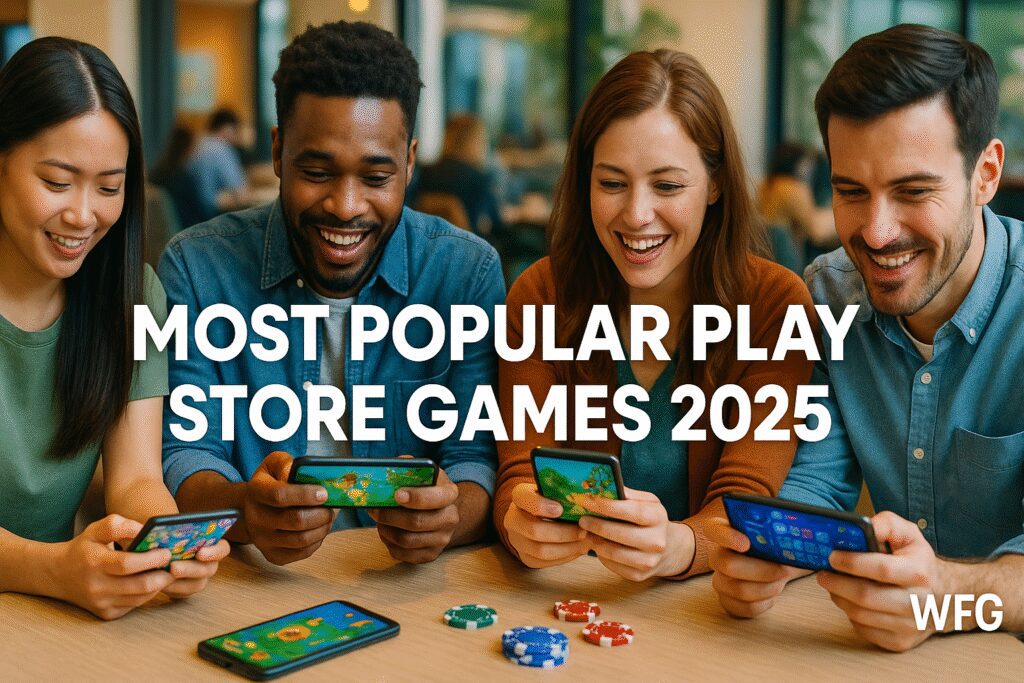Most popular games on Play Store continue to reshape the mobile gaming industry, generating billions in revenue while attracting millions of daily active users across diverse demographics. The Google Play Store ecosystem has evolved into a sophisticated marketplace where strategic game development, user acquisition, and monetization models determine which titles rise to the top of the charts.
Understanding the current landscape requires examining both quantitative metrics and qualitative factors that drive sustained popularity. From battle royale sensations to puzzle game phenomena, the most successful mobile games share common characteristics that savvy developers and industry researchers can analyze for actionable insights.
Current Play Store Gaming Landscape Overview
The mobile gaming market on Google Play Store reached unprecedented heights in 2025, with over 2.8 billion downloads in the first quarter alone. Revenue figures tell an even more compelling story, as the top 100 games generated approximately $18.2 billion globally, representing a 12% increase from the previous year.

Geographic analysis reveals fascinating patterns in user behavior. Asian markets, particularly India and Indonesia, drive the highest download volumes, while Western markets like the United States and United Kingdom contribute disproportionately to revenue generation. This disparity highlights the importance of regional monetization strategies for developers seeking global success.
Top Mobile Game App Development Companies in 2025
Key performance indicators show that games maintaining top positions for extended periods typically achieve 30-day retention rates exceeding 25%, compared to the industry average of 8-12%. These sustained engagement metrics directly correlate with long-term profitability and Play Store algorithm favorability.
Top 10 Most Downloaded Games on Play Store Right Now
Current data indicates that multiplayer battle royale games continue dominating download charts, with titles like PUBG Mobile and Free Fire maintaining their positions through consistent content updates and competitive gaming events. These games average 50-80 million monthly downloads, significantly outpacing other genres.
Puzzle games represent the second-largest category, with match-three and word puzzle variants showing remarkable staying power. Candy Crush Saga and its variants still command impressive download numbers, demonstrating the enduring appeal of casual gaming mechanics optimized for mobile interfaces.
Role-playing games have experienced significant growth, particularly those incorporating gacha mechanics and collaborative gameplay elements. Genshin Impact leads this category, generating substantial revenue despite being relatively download-intensive compared to lighter casual games.
Social gaming apps blur the line between traditional gaming and social media, with titles like Among Us and Fall Guys creating viral moments that translate into massive download spikes. These games demonstrate how community-driven content and streamer adoption can rapidly accelerate popularity metrics.
Genre Leaders Dominating Play Store Rankings
Battle Royale and Shooter Games
Battle royale games maintain their grip on the most popular games on Play Store through sophisticated matchmaking systems and regular content cycles. PUBG Mobile leads with over 1 billion downloads lifetime, while Call of Duty Mobile and Free Fire compete for regional dominance.
Success factors include cross-platform compatibility, competitive esports integration, and continuous map rotations that maintain player interest. Revenue models typically combine battle passes, cosmetic purchases, and premium currency systems that generate substantial per-user revenue.
Puzzle and Casual Gaming Dominance
Casual puzzle games demonstrate remarkable longevity, with some titles maintaining top-50 positions for over five years. King’s portfolio, including Candy Crush Saga and Bubble Witch, exemplifies how iterative gameplay improvements and social features sustain engagement.
These games excel at onboarding new users quickly while implementing progressive difficulty curves that encourage continued play. Monetization strategies focus on convenience purchases rather than pay-to-win mechanics, creating sustainable revenue streams without alienating casual players.
RPG and Strategy Game Performance
Role-playing games command higher average revenue per user but face greater competition for sustained attention. Successful titles like Raid: Shadow Legends and AFK Arena leverage collection mechanics, guild systems, and idle gameplay elements that accommodate varying player commitment levels.
Strategy games require more sophisticated marketing approaches but tend to generate highly engaged, long-term user bases. These games often implement complex progression systems that reward both strategic thinking and consistent daily engagement.
Social and Multiplayer Gaming Trends
Social gaming experiences are reshaping how players interact with mobile games. Titles incorporating voice chat, guild systems, and collaborative challenges consistently outperform single-player alternatives in retention metrics.
The integration of social media sharing features and spectator modes has created viral marketing opportunities that traditional advertising cannot replicate. Games that successfully build communities around their core mechanics often achieve organic growth rates exceeding paid acquisition campaigns.
What Makes These Games Successful: Key Success Factors
User Acquisition Strategies
Most popular games on Play Store employ sophisticated user acquisition funnels that combine organic discovery optimization with targeted advertising campaigns. Successful titles typically allocate 60-80% of their marketing budgets to paid acquisition while investing heavily in app store optimization.
Creative testing represents a crucial component, with top games running hundreds of video ad variations to identify high-converting content. Cross-promotion networks allow established publishers to leverage existing user bases for new title launches.
Monetization Model Analysis
Freemium models dominate successful mobile games, with less than 3% of users typically making purchases. However, those who do spend money often generate substantial lifetime value, with average spending ranging from $20-200 depending on game genre and target demographic.
Subscription models are gaining traction, particularly for games offering premium content, ad-free experiences, or exclusive rewards. Battle pass systems have proven especially effective, generating predictable monthly revenue while maintaining player engagement through time-limited content.
User Retention Mechanics
Daily login bonuses, limited-time events, and social features create compelling reasons for players to return consistently. Games achieving 30-day retention rates above 20% typically implement multiple retention mechanics that activate at different stages of the player lifecycle.
Progressive reward systems, guild interactions, and competitive elements maintain long-term engagement beyond the initial novelty period. Push notification strategies play crucial roles, with successful games sending 2-4 personalized messages weekly without triggering user fatigue.
Emerging Trends Shaping Play Store Game Rankings
AI Integration in Mobile Gaming
Artificial intelligence integration is revolutionizing mobile game development, from procedural content generation to personalized difficulty adjustment. Games implementing AI-driven features show improved user satisfaction scores and extended play sessions.
Machine learning algorithms optimize in-game economies, predict player behavior, and customize content recommendations. These technological advances enable smaller development teams to create more engaging experiences while reducing traditional development costs.
Cross-Platform Gaming Growth
Cross-platform compatibility has become essential for competitive games, with players expecting seamless transitions between mobile and PC versions. Games supporting cross-progression and cross-play consistently achieve higher user acquisition and retention rates.
Cloud gaming services are eliminating hardware limitations, allowing mobile devices to run console-quality games. This trend is expanding the addressable market for premium gaming experiences on mobile platforms.
Sustainability and Ethical Gaming
Environmental consciousness is influencing game development decisions, with publishers implementing carbon-neutral server infrastructure and sustainable development practices. Players increasingly favor games from companies demonstrating social responsibility.
Ethical monetization practices are becoming competitive advantages, as regulatory scrutiny increases around loot boxes and gambling-adjacent mechanics. Games emphasizing fair play and transparent purchasing options build stronger community loyalty.
Regional Variations: Global vs Local Game Preferences
Geographic preferences reveal significant cultural influences on game popularity. Asian markets favor social RPG experiences with collaborative elements, while Western audiences gravitate toward competitive shooter and strategy games.
Local regulations impact available monetization options, requiring developers to adapt business models for different regions. Understanding these regulatory landscapes becomes crucial for global game distribution strategies.
Cultural themes, art styles, and gameplay mechanics that resonate in one region may require significant adaptation for success elsewhere. Successful global games either embrace universal themes or invest in comprehensive localization efforts.
Developer Insights: Studios Behind the Most Popular Games
Major publishers like Tencent, Activision Blizzard, and King dominate revenue charts, but independent developers continue finding success through innovative gameplay mechanics and niche market targeting. The democratization of game development tools enables smaller teams to compete effectively.
Investment trends show increasing venture capital interest in mobile gaming startups, particularly those developing emerging technologies like AR integration or blockchain-based economies. However, the majority of funding still flows toward proven game genres with established monetization models.
Strategic acquisitions continue reshaping the competitive landscape, as major publishers seek to expand their genre expertise and regional market presence. These consolidation trends may limit opportunities for independent developers while creating more polished gaming experiences.
Future Predictions: What’s Next for Play Store Gaming
The next 12-24 months will likely see continued growth in hybrid casual games that combine simple mechanics with deeper progression systems. Augmented reality features will become more prevalent as smartphone hardware capabilities improve.
Subscription gaming services may disrupt traditional freemium models, offering curated game libraries for monthly fees. However, individual game purchases and in-app transactions will remain dominant revenue sources for most developers.
War Thunder Free Online Game: How to Get the Most Out of Playing Without Spending a Dime
Regulatory changes regarding data privacy and digital payments will require adaptation from developers and publishers. Games that proactively address these concerns while maintaining engaging experiences will gain competitive advantages in an increasingly regulated environment.
Frequently Asked Questions
What are the most downloaded games on Google Play Store currently?
The most downloaded games include PUBG Mobile, Free Fire, Candy Crush Saga, Subway Surfers, and Among Us, with each generating tens of millions of monthly downloads across different genres and demographics.
How do games become popular on Play Store?
Games achieve popularity through effective app store optimization, engaging gameplay mechanics, strategic marketing campaigns, positive user reviews, and consistent content updates that maintain player interest over time.
What game genres perform best on Play Store?
Battle royale, puzzle, RPG, and social games consistently dominate charts, though success depends on execution quality, monetization strategy, and target audience alignment rather than genre alone.
How much revenue do top Play Store games generate?
Top-performing games generate millions in monthly revenue, with the highest earners like Genshin Impact and PUBG Mobile earning over $100 million annually from Google Play Store alone.
What makes mobile games retain players long-term?
Successful retention strategies include daily rewards, social features, regular content updates, progressive difficulty curves, and community-building elements that create emotional investment in the gaming experience.




Pingback: free games you can win money online